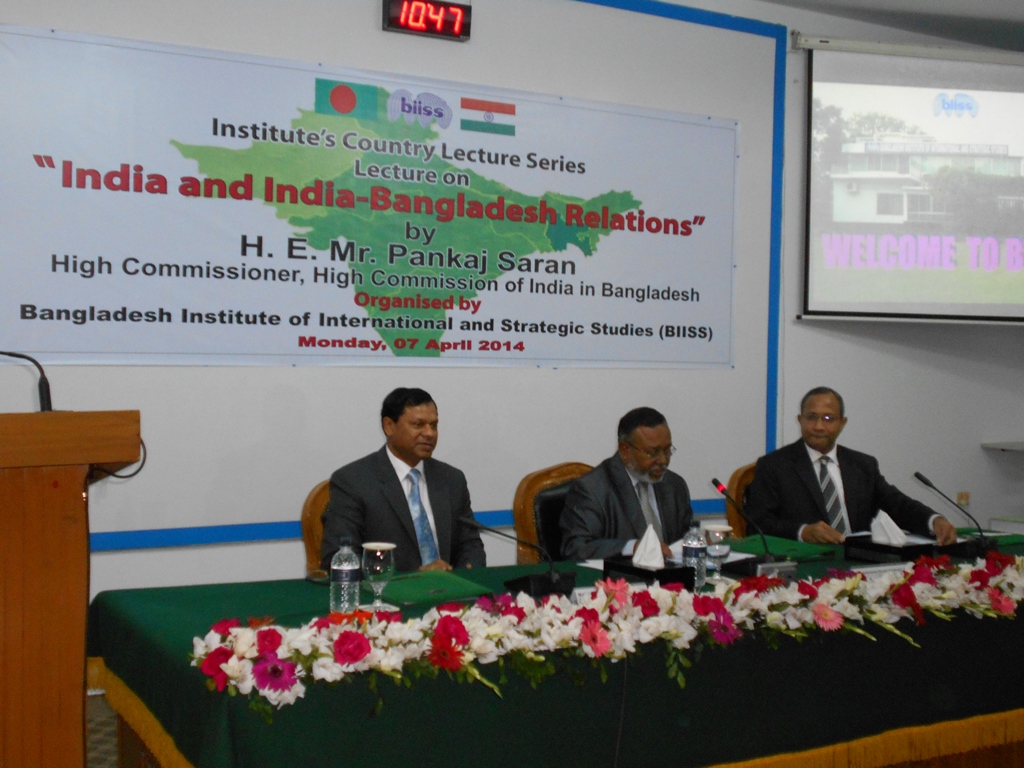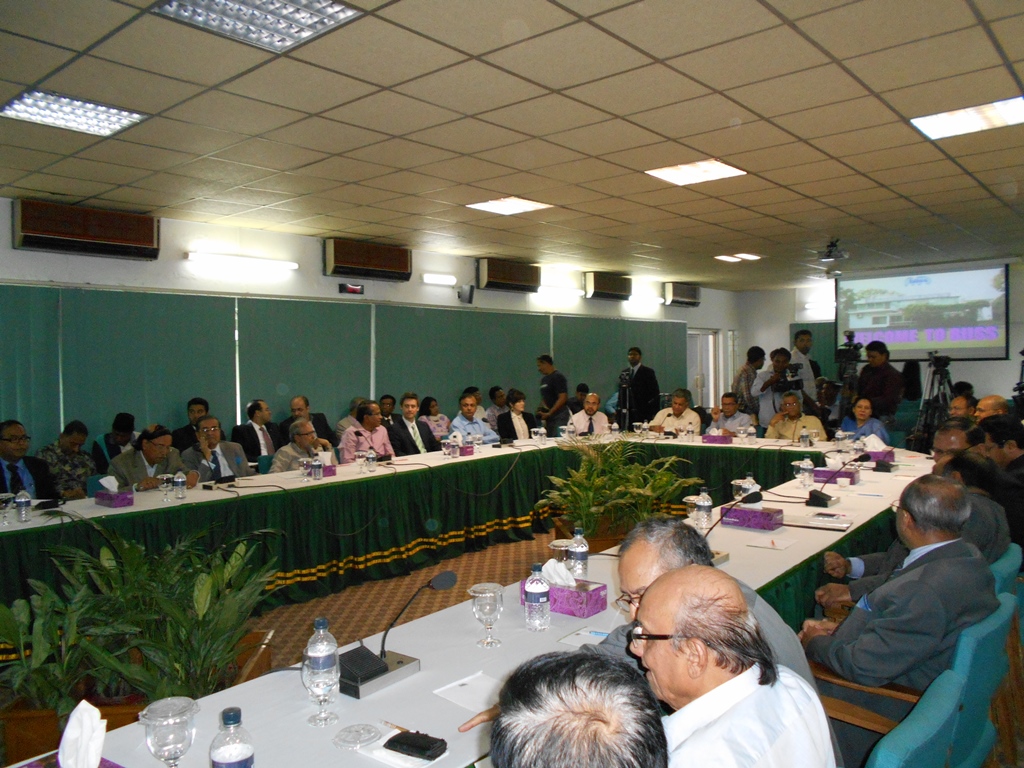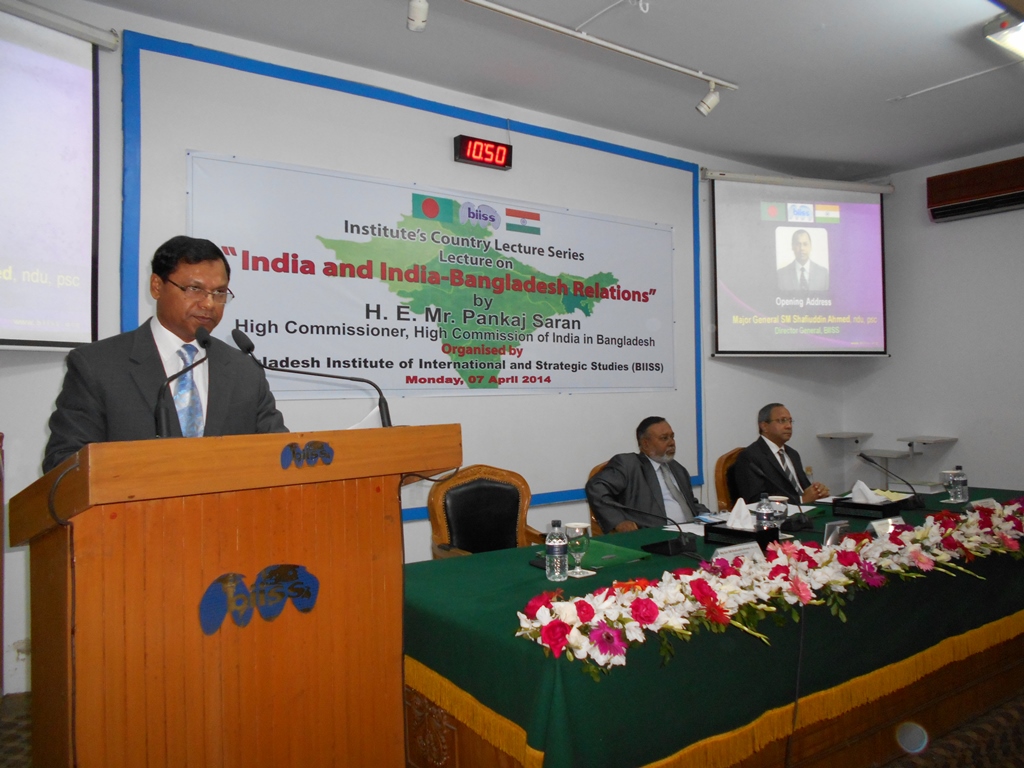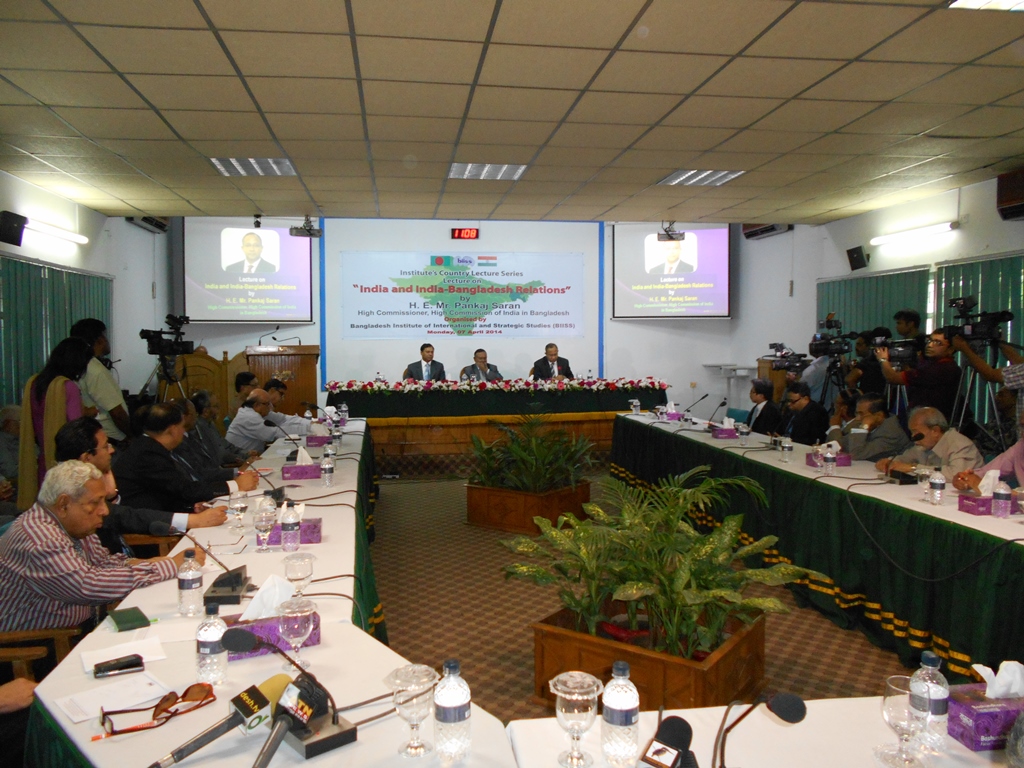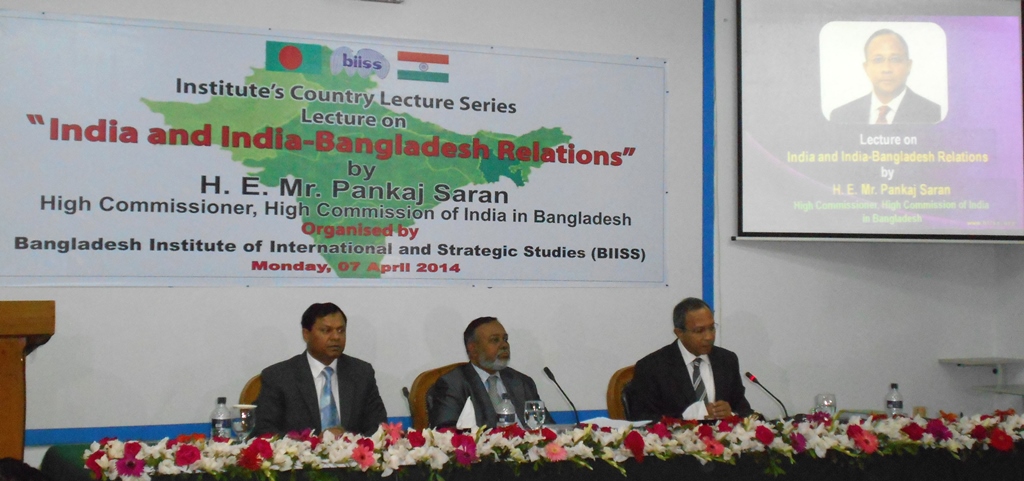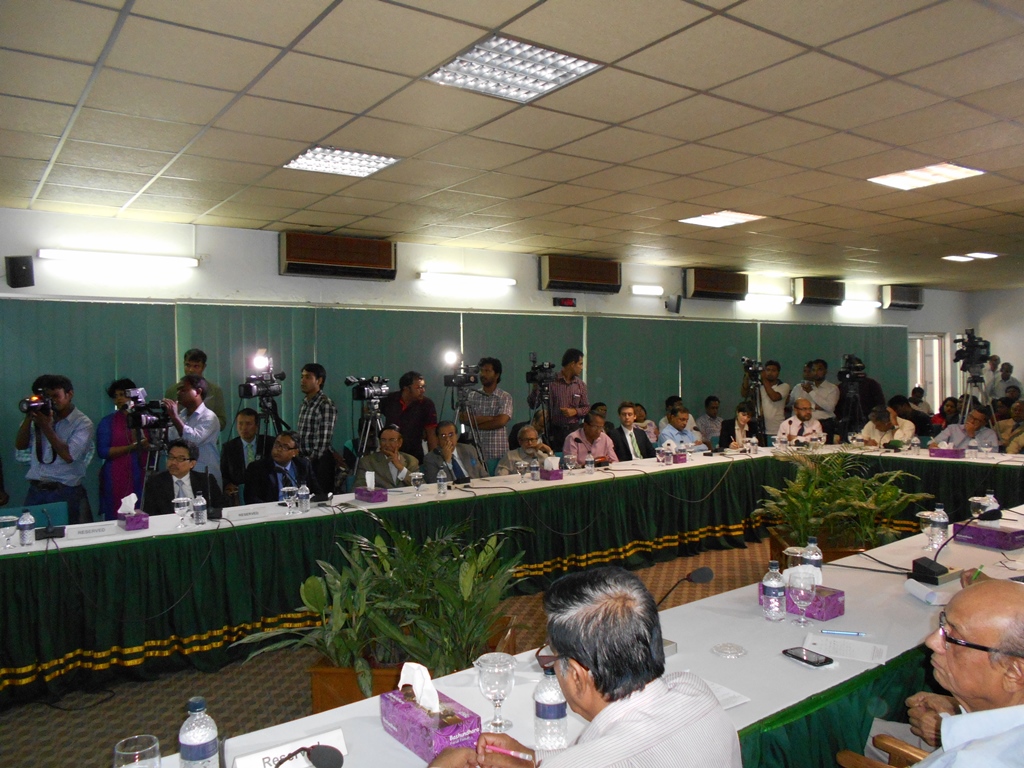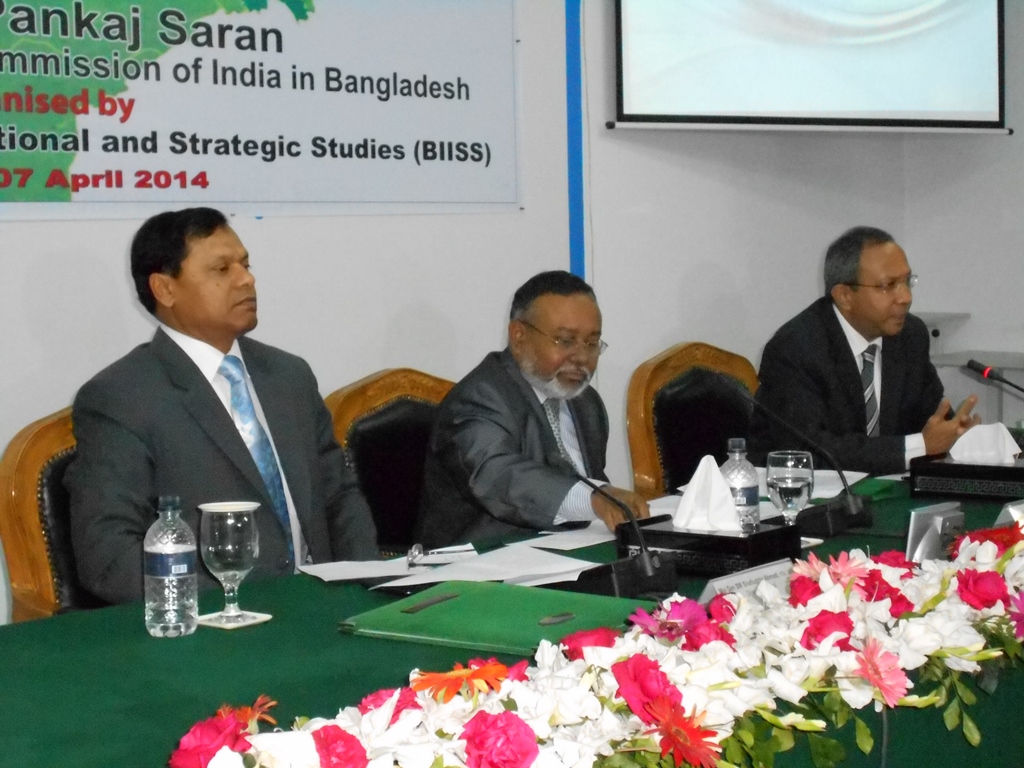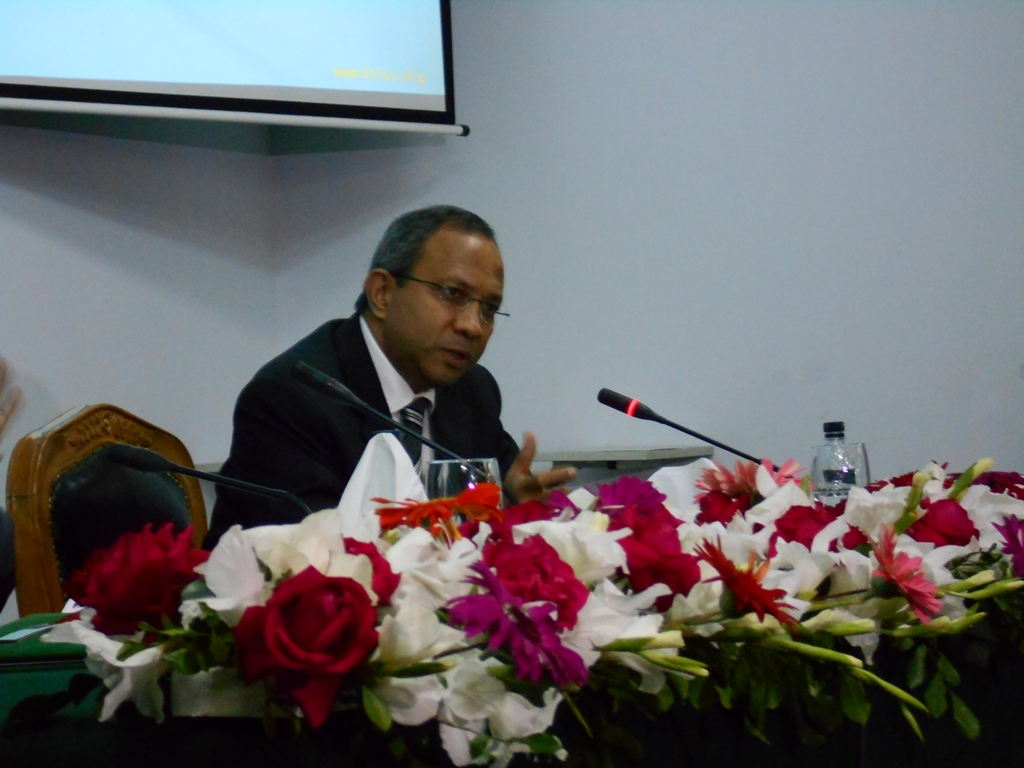Country Lecture on India and India-Bangladesh Relations on 07 April 2014
DATE: 2014-04-07
Bangladesh Institute of International and Strategic Studies (BIISS) organised its Country Lecture on India and India-Bangladesh Relations on 07 April 2014 at BIISS auditorium, Dhaka. The Country Lecture was delivered by H. E. Mr. Pankaj Saran, High Commissioner of India to Bangladesh. He spoke about India's role in international arena and highlighted various aspects of India-Bangladesh relations. Major General SM Shafiuddin Ahmed, ndu, psc, Director General of BIISS, delivered the Opening Address. Ambassador Munshi Faiz Ahmad, Chairman, Board of Governors, BIISS chaired the session and summed up with the concluding speech.
In his Opening Address, Major General SM Shafiuddin Ahmed, ndu, psc, Director General, BIISS, mentioned that the purpose of the Country Lecture is to enhance the understanding about specific countries with which Bangladesh has bilateral relations and to explore the potentials and avenues to promote and strengthen further our relations with these countries. He highlighted India's extraordinary assistance to our War of Liberation in 1971 and for that expressed his sincerest thanks and gratitude to the people of India through the high commissioner for their unstinted support. He noted that India nowadays is often attributed as a political and economic powerhouse and in terms of Purchasing Power Parity it now stands as the fourth largest economy of the world. He described the bilateral relations between the two county is important and they need to explore every opportunity to work together to guarantee all potential enhancements of this relations for the sake of mutual progress and prosperity.
H. E. Mr. Pankaj Saran, High Commissioner of India to Bangladesh, in his lecture on India and India-Bangladesh Relations focused various aspects of India's external policy and its relation with Bangladesh. Noting that work for peace, development, prosperity and cooperation with neighbouring countries as fundamental principles of Indian foreign policy, he added that India aspires to engage with countries for promoting mutual sovereignty, trade, environmental security and prosperity. He mentioned that Indian economy is heading towards rapid development basing on democracy and fundamental rights of people. He noted that after its economic reform in 1991, the economy is booming and since 2004-2005 twenty million people were taken out of poverty every year. The major strengths of Indian economy are its huge domestic market, high savings and large scale investments, he added. Admitting poverty reduction as a big challenge for the country, the high commissioner noted that beside alleviating poverty it is giving more emphasis on food security, energy security, environmental security and water security.
While discussing India-Bangladesh relations, he told the audience that both economies are growing fast together. He noted that Bangladesh has excellent economic ties with the eastern part of India. He opined that India-Bangladesh relation is going forward through right track. He added that in recent years both countries have become able to increase the trade volume and in last year Bangladesh's export to India was the highest than any other year and there are still scopes to increase and diversify the trade volume. Mr. Saran mentioned that the two countries are jointly working on water sharing issue of Ganges, Feni and Teesta river. He hoped that the two neighbouring countries will be able to peacefully resolve the issues of Tipaimukh dam and the maritime boundary disputes.
Munshi Faiz Ahmad, Chairman, Board of Governors, BIISS, noted that Bangladesh and India are two closest neighbours in South Asia whose history, culture and values of peoples have been evolving together, side by side, for millennia. He gratefully recalled India's support to our War of Liberation and paid homage to the brave Indian soldiers and others who sacrificed their lives for our liberation. He added the country is also a key player in ongoing multilateral negotiations on major global issues, namely trade, climate change, energy security, counter terrorism and transnational crimes etc. He hoped that Bangladesh and India will resolve the issue of maritime boundary dispute in June this year which will help to remove an important irritant between the two countries and will usher in a new era of cooperation.
Senior civil and military officials including former ambassadors, members of the academia, businessmen, representatives of think-tanks, scholars, and policy makers participated in the open discussion session and raised their valuable opinions, suggestions and questions on India-Bangladesh relations. Participants of the open discussion session thanked the Indian govt. for easing the Indian visa process and raised questions on trade and trade barriers, Tipaimukh dam, border agreement etc. While answering those questions, Mr. Saran noted that India has given Duty Free and Quota Free (DFQF) access to almost all Bangladeshi products and is thinking to give DFQF access for rest of the products. And to remove the para tariff and non-tariff barriers the country is working closely with Bangladesh. He mentioned that the custom facilities are being developed which will enhance the trade volume of both countries. The high commissioner told that a group under the Joint River Commission (JRC) is studying extensively about the probable impact of Tipaimukh dam.

